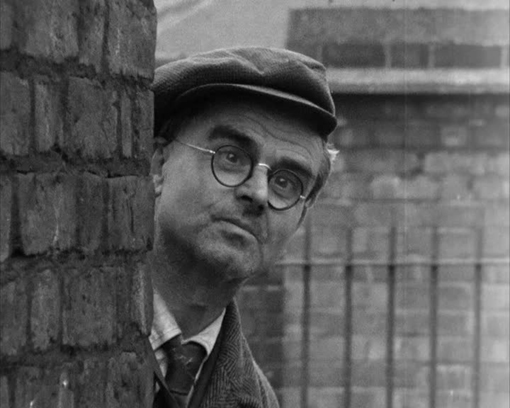Visions of Change – The Evolution of the British TV Documentary
Also included is Mitchell’s earlier Night in the City (tx. 14 June 1957), a vivid series of vignettes about ‘people caught up in the restlessness and loneliness of the city night’. Both films were adapted from equally masterful radio features, and both illustrate Mitchell’s vision of the proletarian city not so much as a place of huddled masses awaiting the beneficence of social reformers (as in the Griersonian documentary), but as a theatre in which housewives, tramps and ragged-trousered philosophers alike are given the chance to opine. Mitchell’s first love was the theatre; his second was radio, which led him to discover real-life ‘characters’ as remarkable as the creations of any playwright. By the time he ventured into television he was the tribune of eccentric self-determination.
Interestingly, it was thanks to the advocacy and mentorship of Denis Mitchell at the end of the fifties that Dennis Potter, then a twenty-five-year-old year old BBC trainee, was commissioned to make Between Two Rivers. An autobiographical documentary about growing up in – and being uprooted from – the close-knit community of the Forest of Dean, Between Two Rivers (tx. 3 June 1960) has been described by W. Stephen Gilbert as ‘an iconography of a Forest of Dean childhood, lovingly displayed, then scorned, then re-embraced (from The Life and Work of Denis Potter, 2002). As such it is an evocation of the disorientation of the scholarship boy caught between two worlds, with Potter echoing Richard Hoggart’s The Use of Literacy (first published in 1957) by denouncing the synthetic ‘admass’ culture which he felt was corrupting and replacing working-class culture.

‘Morning in the Streets’ (Image: BBC/BFI)
Another documentary pioneer who had made the journey from radio to television during this period was Philip Donnellan, who is also represented here by two films. The Colony (tx. 16 June 1964) captured – through their own testimony – what life was like for West Indians living in Birmingham, at a time when the presence of immigrants was persistently perceived and referred to as a ‘problem’ in politics and the media (for more on this see the recent Channel 4 documentary Britain’s Racist Election). One of the resounding moments in this remarkable film is Stan Crooke, a railway signalman from Saint Kitts, talking about the complexities of his relationships with his colleagues whilst calmly going about his work pulling levers and changing switches — as if to reinforce the point that the subjects of the new documentary era are not just working people but working people with expressive competences hitherto untapped by broadcasters. Likewise Donnellan’s first film, Joe the Chainsmith (tx. 7 November 1958) benefits enormously from the charisma of the titular Joe Mallen, a dog-breeder and foreman of a team which forged heavy iron chains in the small Black Country town of Cradley Heath. Joe emerges onto the screen larger than life and as a sort of miraculous survival from an earlier era — as yet untouched by ‘admass’.
 Learning on Screen
Learning on Screen